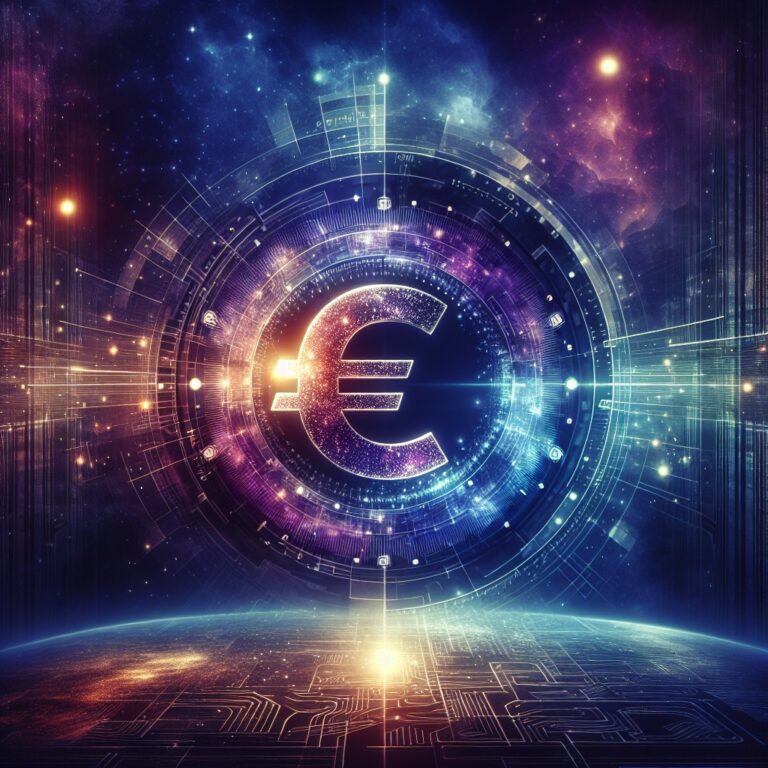In a groundbreaking move for Europe’s cryptocurrency landscape, Deutsche Bank’s asset management unit DWS, alongside partners Flow Traders and Galaxy, has announced plans to launch Germany’s first regulated euro-denominated stablecoin. This development follows the acquisition of an e-money institution (EMI) license from Germany’s Federal Financial Supervisory Authority (BaFin) earlier this week. Dubbed the AllUnity EURAU stablecoin, the project aims to set new standards for transparency and integration within the rapidly evolving digital financial ecosystem.
A New Player in the Euro Stablecoin Arena
This isn’t just another coin entering an already bustling market. The AllUnity EURAU stablecoin is designed to be fully compliant with the European Union’s Markets in Crypto Assets (MiCA) framework, which has been reshaping the regulatory landscape since its implementation last year. The stablecoin promises 100% collateralization, offering institutional-grade transparency through rigorous proof of reserves and ongoing regulatory reporting. This, according to insiders, isn’t merely about ticking regulatory boxes—it’s about instilling confidence in a traditionally cautious market.
The stablecoin is poised to facilitate 24/7 instant cross-border settlements, which could be a game-changer for financial institutions, fintech companies, and enterprise clients not only in Europe but globally. “This license is not just a regulatory hurdle cleared,” said Alexander Höptner, CEO of AllUnity. “It’s a foundational step towards building a truly secure, transparent, and compliant digital cross-border payment ecosystem for Europe and global markets.”
The Broader Context in the Euro-Stablecoin Market
The timing of this launch is notable. The MiCA framework has enabled a surge of euro-pegged tokens in the past year, including Circle’s EURC and Société Générale’s EURCV. These coins have joined the ranks of MiCA-compliant dollar coins like SocGen’s USDCV and the Robinhood-backed Global Dollar USDG. The market cap for euro stablecoins has climbed to nearly $500 million, a testament to growing demand and acceptance. For more on this trend, see our recent article on the Market Cap of Euro Stablecoins Surges to Nearly $500M as EUR/USD Rivals Bitcoin’s H1 Gains.
Analysts point to the increasing competition among euro stablecoins as both a challenge and an opportunity. “There’s a ballooning interest in stablecoins pegged to the euro,” noted FinTech analyst Martina Köhler. “With the euro’s relative stability, these coins are becoming attractive alternatives for investors wary of the volatility inherent in cryptocurrencies like Bitcoin.”
Navigating the Future of Euro-Pegged Tokens
As the AllUnity EURAU stablecoin prepares to enter the market, questions remain about its long-term impact. Will it lead to an even more competitive landscape for euro-based digital assets, possibly spurring further innovation? Or will it face challenges in gaining traction amidst established players?
Critically, the success of EURAU will likely depend on the ability to deliver on its promise of transparency and seamless integration. These factors could determine whether it becomes a mainstay in cross-border transactions or fades into obscurity. The collaboration between Deutsche Bank’s DWS, Flow Traders, and Galaxy underscores a broader trend of traditional financial institutions embracing digital assets, albeit with careful regulatory navigation. This follows a pattern seen in other initiatives, such as the Crypto firm for Deutsche, State Street launches private stablecoin contract.
Looking ahead, the implications of this venture could extend beyond the immediate sphere of euro-pegged stablecoins. It raises broader questions about the role of regulation in fostering innovation and ensuring stability in the fast-paced world of digital finance. As more countries develop their own regulatory frameworks, the landscape for stablecoins—both euro-denominated and otherwise—will continue to evolve.
The journey of AllUnity EURAU is just beginning, and while its future remains unwritten, one thing is clear: the euro stablecoin market is no longer a niche sector. It’s a dynamic arena capturing the attention of investors, regulators, and financial institutions worldwide. And for now, all eyes are on Germany’s newest digital asset as it prepares to make its mark.
Source
This article is based on: Deutsche Bank’s DWS, Galaxy, Flow Traders Venture to Introduce German-Regulated Stablecoin
Further Reading
Deepen your understanding with these related articles:
- Bitcoin Price Warnings Emerge, Stablecoins Score Regulatory Win: Binance Weekly Report
- As stablecoin bill heads to House, Senate shifts to market structure
- Stablecoins Are the ‘Quiet Winners’ of Polymarket’s Surge: Coinbase Research

Steve Gregory is a lawyer in the United States who specializes in licensing for cryptocurrency companies and products. Steve began his career as an attorney in 2015 but made the switch to working in cryptocurrency full time shortly after joining the original team at Gemini Trust Company, an early cryptocurrency exchange based in New York City. Steve then joined CEX.io and was able to launch their regulated US-based cryptocurrency. Steve then went on to become the CEO at currency.com when he ran for four years and was able to lead currency.com to being fully acquired in 2025.


